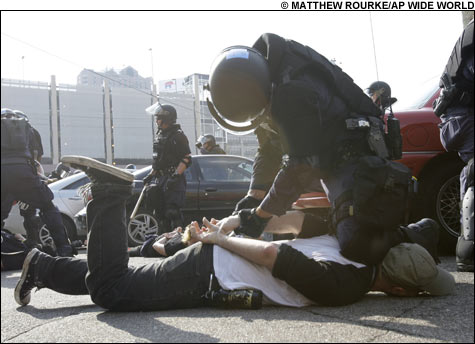
‘WELL-CONNECTED’: After taking the photo above, of a conflict between law enforcement and RNC protesters, Associated Press photographer Matt Rourke was himself tackled and bloodied by police. He was arrested and held for 10 hours, then released without being charged. |
Given the media’s reputation for self-absorption, it’s remarkable how little attention the press has paid to the crackdown on journalists during September’s Republican National Convention. While the exact tally varies from source to source, it seems that close to 50 journalists were detained or arrested in St. Paul (out of approximately 800 arrests total) while covering protests outside the convention. Some of them were treated gently and released quickly, but others were held at length or roughed up by the police. What’s more, a pre-convention raid on a St. Paul home targeted members of I-Witness Video, a New York group whose work exonerated hundreds of protesters following the 2004 RNC. And while St. Paul city attorney John Choi announced, on September 19, that many cases against journalists wouldn’t be pursued — in particular, those involving the possible misdemeanor count of presence at an unlawful assembly — these decisions are being made on a case-by-case basis and are far from complete.
Oddly, though, the jeopardy that journalists faced in St. Paul never became much of a story. There wasn’t a news blackout, exactly: the Associated Press (AP) and the local Minnesota media covered the issue, as did left-leaning outlets like the Nation and Salon, and national heavyweights like ABC News and the Washington Post gave it some early, blog-based coverage.
The problem, instead, is that the story was ignored or minimized by other important organizations — the New York Times being the most prominent example — and, as the weeks progressed, never seemed to generate any sort of sustained concern inside the media itself, the efforts of groups like the Society for Professional Journalists notwithstanding. In the words of Mark Jurkowitz, associate director of the Pew Research Center’s Project for Excellence in Journalism, “It never really got into the conversation at a level where it had an impact.”
What’s especially strange about this is that the activity that got these journalists into trouble — monitoring the exercise of government power — is one of the most important things the fourth estate does. So why the muted response to their plight?
A bridge, too far?
One answer, obviously, is that it’s been kind of a busy month. Think of the other stories that have been kicking around since the first journalists were arrested on September 1, the RNC’s opening day: Hurricane Gustav, Sarah Palin’s debut, McCain’s acceptance speech and post-convention bump, the sequestering of Palin, her subsequent public implosion, the Wall Street meltdown, McCain’s one-day suspension of his campaign, the first presidential debate, Obama regaining front-runner status. Oh yeah, and Hurricane Ike.
There’s also the Amy Goodman Effect to consider. Goodman, the host of the independent radio and TV program Democracy Now!, was arrested on September 1, after trying to reach two of her producers — Nicole Salazar and Sharif Abdel Kouddous — who’d been arrested and injured while covering a clash between police and protesters. Goodman’s arrest in particular quickly became a cause célèbre on the left, thanks largely to an arrest video that was posted on democracynow.org and became YouTube’s most-watched video on September 1 and 2.
In retrospect, though, Goodman’s status as the RNC’s designated media martyr may actually have deterred further coverage. “Amy Goodman and her colleagues aren’t considered part of the fraternity,” notes Eric Alterman, the Nation media critic and author of What Liberal Media? The Truth About Bias and the News. “They’re actually enormously resented by many journalists, and with good reason: they treat the mainstream media as if it’s part of a corporate conspiracy to keep people from knowing the truth. There’s not the sense of affinity there. They’re viewed more as activists than as journalists in the minds of many.”
In addition, some observers question the wisdom of Goodman’s actions in St. Paul. The day after her arrest, Goodman told the Phoenix that she’d been arrested without warning after attempting to get to Salazar and Kouddous. But the video of her arrest is more ambiguous. Goodman approaches a cop in full riot gear and tries to explain her intent. He tells her three times, quickly, to go back to the sidewalk. When she doesn’t, he attempts to push her toward the sidewalk; as he does, she protests that she’s got full convention credentials. He keeps pushing; she keeps protesting; then he tells his colleagues to arrest her.
Did Goodman go too far? Lucy Dalglish — the executive director of the Reporters Committee for Freedom of the Press, which maintained a legal hotline for detained journalists during the RNC — seems to think so. “She went up there and got in the cop’s face,” says Dalglish. “I’m not surprised she was arrested.” (Goodman and her producers no longer face charges.)